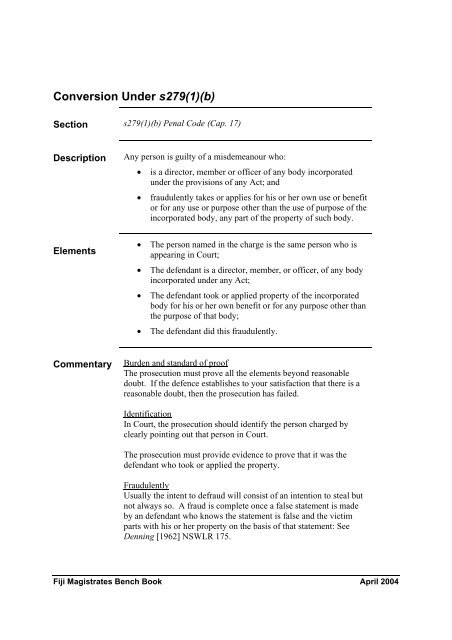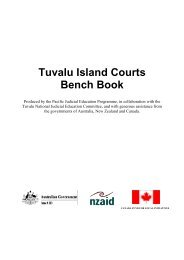- Page 1 and 2:
Fiji Magistrates Bench Book Produce
- Page 3 and 4:
Table of Contents 1: The Law and Co
- Page 5 and 6:
4 Real Evidence 5 Exhibits 6 Oral E
- Page 7 and 8:
9: First Appearance 1 General 2 Non
- Page 9 and 10:
13: Sentencing 1 Introduction 2 Jur
- Page 11 and 12:
PJEP BENCHBOOK PROJECT 2003/2004 TE
- Page 13 and 14:
Fiji Magistrates Bench Book April 2
- Page 15 and 16:
3.1 The Fiji Constitution The first
- Page 17 and 18:
4 The Branches of the State 4.1 The
- Page 19 and 20:
Prime Minister The Prime Minster mu
- Page 21 and 22:
5 Jurisdiction Jurisdiction is the
- Page 23 and 24:
2: FIJI MAGISTRATE’S COURT Fiji M
- Page 25 and 26:
1 Introduction The Magistrate’s C
- Page 27 and 28:
• make copies of proceedings and
- Page 29 and 30:
4.4 Sentencing Jurisdiction Residen
- Page 31 and 32:
in suits wherein the validity of an
- Page 33 and 34:
By application of a Magistrate Subj
- Page 35 and 36:
Fiji Magistrates Bench Book April 2
- Page 37 and 38:
Also, see State v Peniasi Kata Cr.
- Page 39 and 40:
For the defendant to have a fair tr
- Page 41 and 42:
An exception for the requirement fo
- Page 43 and 44:
4: JUDICIAL CONDUCT Fiji Magistrate
- Page 45 and 46:
1 Ethical Principles On appointment
- Page 47 and 48:
1.5 “Without Fear or Favour, Affe
- Page 49 and 50:
d) Conflict of interest You must di
- Page 51 and 52:
1. Prior notice • You should be s
- Page 53 and 54:
• Avoid a patronising and or undu
- Page 55 and 56:
5: EVIDENCE Fiji Magistrates Bench
- Page 57 and 58:
1 Introduction Evidence refers to t
- Page 59 and 60:
By definition, documentary evidence
- Page 61 and 62:
The distinction between ‘in Court
- Page 63 and 64:
Spouses The spouse of the defendant
- Page 65 and 66:
7.3 Leading Questions A general rul
- Page 67 and 68:
• Sometimes the witness will show
- Page 69 and 70:
If the legal burden is borne by the
- Page 71 and 72:
In a voir dire hearing, evidence sh
- Page 73 and 74:
• ensure that the witness who giv
- Page 75 and 76:
8.8 Character Evidence Admissibilit
- Page 77 and 78:
6: CRIMINAL RESPONSIBILITY Fiji Mag
- Page 79 and 80:
1 Introduction The Penal Code is th
- Page 81 and 82:
An honest claim of right is when a
- Page 83 and 84:
To raise a defence of accident, it
- Page 85 and 86:
It is the defendant who bears the o
- Page 87 and 88:
3 Intoxication must also be taken i
- Page 89 and 90:
Compulsion by threats Compulsion by
- Page 91 and 92:
• Force may include killing the a
- Page 93 and 94:
Enabling or Aiding: s21(1)(b) Penal
- Page 95 and 96:
Counselling The normal meaning of c
- Page 97 and 98:
Withdrawal Sometimes there may be a
- Page 99 and 100:
4.3 Accessories After the Fact: ss3
- Page 101 and 102:
• At least two persons must agree
- Page 103 and 104:
Fiji Magistrates Bench Book April 2
- Page 105 and 106:
2.2 Endorsing the Criminal Evidence
- Page 107 and 108:
• Deal with matters that counsel
- Page 109 and 110:
In the unique case of Reginam v Net
- Page 111 and 112:
When the alleged offence occurs in
- Page 113 and 114:
See Akuila Kuoutawa & R Labasa Crim
- Page 115 and 116:
12 Case Management The American Bar
- Page 117 and 118:
8: PRE-TRIAL MATTERS Fiji Magistrat
- Page 119 and 120:
1 The Criminal Process The followin
- Page 121 and 122:
In the event of a person whom such
- Page 123 and 124:
If the charge is defective: • ret
- Page 125 and 126:
3.2 Warrant of Arrest Notwithstandi
- Page 127 and 128:
If, in the course of trial, the evi
- Page 129 and 130:
Fiji Magistrates Bench Book April 2
- Page 131 and 132:
2 Non-Appearance by the Defendant I
- Page 133 and 134:
Explaining the charge to the defend
- Page 135 and 136:
For example, on a charge of malicio
- Page 137 and 138:
Immediate hearing If all parties ar
- Page 139 and 140:
10: DEFENDED HEARINGS Fiji Magistra
- Page 141 and 142:
1 Magistrate’s Notes A suggestion
- Page 143 and 144:
2.4 Plea of Guilty to Other Offence
- Page 145 and 146:
A convenient test is found in the P
- Page 147 and 148:
5.6 Lies If it is established that
- Page 149 and 150:
7 Exhibits 7.1 Production Though it
- Page 151 and 152:
11: BAIL Fiji Magistrates Bench Boo
- Page 153 and 154:
1 Introduction The Bail Act 2002 se
- Page 155 and 156:
4.3 Primary Consideration The prima
- Page 157 and 158:
A “serious offence” is any offe
- Page 159 and 160:
On the granting of bail, the accuse
- Page 161 and 162:
6 Refusal of Bail If bail is refuse
- Page 163 and 164: 12: JUDGMENT Fiji Magistrates Bench
- Page 165 and 166: 1 A Structured Approach to Defended
- Page 167 and 168: 3.1 Judgment Format The format on t
- Page 169 and 170: 13: SENTENCING Fiji Magistrates Ben
- Page 171 and 172: 1 Introduction At the end of a tria
- Page 173 and 174: The judicial act of sentencing need
- Page 175 and 176: These include the following: • pr
- Page 177 and 178: 7 Consideration of Other Offences W
- Page 179 and 180: 9 Types of Sentences 9.1 Corporal P
- Page 181 and 182: 9.5 Supervision As part of the prob
- Page 183 and 184: Police supervision should not excee
- Page 185 and 186: 14: APPEALS, REVISIONS AND CASES ST
- Page 187 and 188: 1 Appeals The Magistrates’ Courts
- Page 189 and 190: Supplementing the record In cases w
- Page 191 and 192: The High Court shall hear and deter
- Page 193 and 194: Fiji Magistrates Bench Book April 2
- Page 195 and 196: Evidence of age In cases where the
- Page 197 and 198: 5 Procedure in Juvenile Courts When
- Page 199 and 200: 6 Sentencing of Juvenile Offenders
- Page 201 and 202: 6.6 Special Considerations Regardin
- Page 203 and 204: 16: COMMON OFFENCES Fiji Magistrate
- Page 205 and 206: False Pretences Under s309(a) Secti
- Page 207 and 208: False Pretences Under s309(b) Secti
- Page 209 and 210: Simple Larceny (Theft) Section s259
- Page 211 and 212: The requirement of permanent depriv
- Page 213: Conversion Under s279(1)(a) Section
- Page 217 and 218: Conversion Under s279(1)(c) Section
- Page 219 and 220: Burglary Section s299 Penal Code (C
- Page 221 and 222: Abuse of Office Section s111 Penal
- Page 223 and 224: Acts Intended to Cause Grievous Har
- Page 225 and 226: Defences If the prosecution has pro
- Page 227 and 228: Robbery Section s293(1)(a) Penal Co
- Page 229 and 230: Robbery (with Violence) Section s29
- Page 231 and 232: Rape Section s149 Penal Code (Cap.
- Page 233 and 234: Corroboration In all sexual offence
- Page 235 and 236: Indecent Assault on a Female Sectio
- Page 237 and 238: Indecently Insulting or Annoying a
- Page 239 and 240: Defilement of Girl under Thirteen Y
- Page 241 and 242: Defilement of Girl between Thirteen
- Page 243 and 244: Defilement of Female Under Severe A
- Page 245 and 246: Dangerous Drugs Section s8(b), 41(2
- Page 247 and 248: Causing Death by Reckless or Danger
- Page 249 and 250: Receiving Stolen Property Section s
- Page 251: Sentence Like Degree The conviction
















